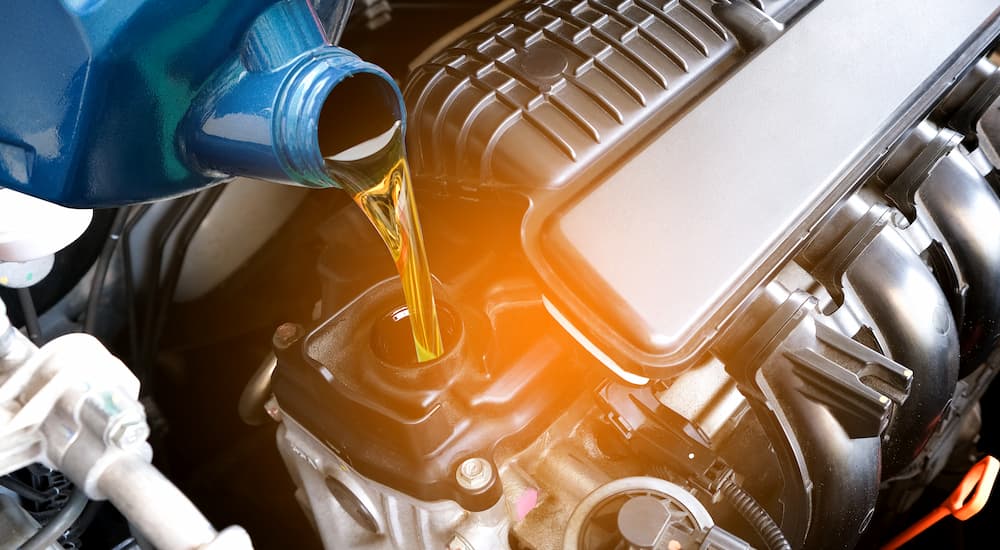There’s no underestimating the importance of motor oil when it comes to the safe, consistent performance of your car, truck, or SUV. This vital fluid plays an invaluable role in keeping your vehicle’s most important—and expensive—component working smoothly, which is why regular oil changes are such an essential part of routine maintenance. Oil degrades due to heat and pressure and accumulates contaminants over time, which can drastically impact its ability to properly lubricate and cool your engine.
Most drivers know that an oil change should occur around every 7,500 miles or at least once a year, but what are the pros and cons of sticking to a more proactive schedule? Is it a waste of money, or a way to get the most out of your engine? We’ll address some of the common misconceptions around the practice, discuss the advantages and disadvantages of early oil changes, and explore the role oil plays in keeping everything running under the hood.
How Often Should You Change Your Oil?
We should start by addressing one of the biggest misconceptions around oil changes. While many of us grew up in a day and age when the recommended interval was around 3,000 miles, advances in automotive engineering and oil technology have seen that guideline become more than a little outdated.
Today’s engines have come a long way since the designs of old, specifically in terms of their internal tolerances. Brands are now able to craft engines with smaller gaps than ever before, meaning less friction, wear and tear, and subsequent risk of oil contamination. Tighter seals also prevent oil from picking up debris, but it’s a new generation of synthetic oil that has had the most notable effect on your oil replacement schedule.
Today’s synthetic oils provide better protection against wear, heat, and degradation, allowing drivers to take a more relaxed approach to maintenance. Better oil filters and oil life monitoring systems also play a role, but if you had to credit one factor with making the 3,000-mile benchmark obsolete, it would have to be the oil itself. Just beware: not every vehicle requires synthetic oil. While it does have its advantages, those who own a car that uses conventional motor oil can’t save a few bucks by sticking with the recommended formula.
So how often should you change your oil? While a 7,500-mile interval is a good benchmark for modern cars, it ultimately depends on your specific make and model and the driving conditions in which your vehicle is being operated. As always, the owner’s manual is a one-stop shop for all the pertinent information you need to keep your car on the road for as long as possible.
Every owner’s manual contains a recommended maintenance schedule that’s specifically formulated for your vehicle, offering you guidance on everything from oil changes and tire rotations to belt, hose, and filter replacements and much more. These manuals will also include what’s known as a “severe maintenance schedule,” which is geared towards vehicles that regularly travel in hot, dusty conditions or are tasked with towing heavy loads.
While referencing the owner’s manual used to be a driver’s only option, many newer models feature built-in service reminders that will keep you abreast of any upcoming oil changes. They not only track the number of miles you’ve driven, but also factor in other data like how hard the vehicle is being pushed and what sort of conditions it’s being driven under.
Regardless of how much technology you have at your disposal, drivers should always make a habit of performing a manual oil check every so often. Electronic systems are prone to failure, and by checking the dipstick once a month, you can help avoid some of the worst-case scenarios that can lead to a hefty repair bill.
Pros of Early Oil Changes
Longer Engine Life
The typical car engine is designed to last well over 100,000 miles, while trucks can easily exceed that number thanks to the durability that comes with their heavy-duty design. However, if you want to enjoy the decades of life your engine has to offer, regular oil changes shouldn’t be overlooked.
Some research suggests that employing a more proactive oil change schedule can extend the engine’s life even further, though there haven’t been any definitive studies performed on the subject. Fresh oil will keep your engine running clean and smooth, and can go a long way towards reducing the pesky wear and tear that comes with regular driving.
Better Fuel Economy
Friction is the bane of any motor. While some rubbing is bound to occur over the course of normal operation, regular oil changes can help reduce resistance and improve the engine’s effectiveness. The easier all the rods, pistons, and other moving parts can operate, the less an engine has to work to move you down the road. If you’re trying to save a little money at the pump, regular oil changes could help put a little cash back into your pocket. Sources suggest that fresh oil can improve fuel economy by as much as two percent.
Reducing Sludge and Deposits
Fresh oil can also help to improve the internal combustion process, keep the engine cool, and prevent the buildup of harmful sludge and deposits. Modern motor oil is truly a miracle substance, protecting the engine from the extreme heat and friction that comes with internal combustion, but it’s still bound to break down over time. Oxidation and heat cause oil to degrade into a sticky, tar-like substance that lacks the heat- and friction-fighting properties of fresh oil and opens drivers up to some significant risks. Regular wear and tear can also cause the oil to become fouled with contaminants that further accelerate the process, which can easily clog important systems and ruin key components.
Cons of Early Oil Changes
Cost
The most obvious downside of early oil changes would have to be the cost. An oil change is far from the most expensive item on your maintenance list, but it can certainly add up over time. Again, it all depends on what sort of oil your vehicle calls for. Drivers who own an older model that runs on conventional motor oil might be able to get away with paying less, but newer synthetic oil will cost more when you pull up to your local lube shop.
Performing your own oil changes can help defray the cost by saving you on labor costs, but it does require a few specialized tools and supplies like an oil filter and the oil itself, as well as a little mechanical know-how and a willingness to get messy. Synthetic oil does last longer, and won’t harm an engine that calls for conventional motor oil, so consider making the investment if you want to save some cash over the long run.
Incorrect Oil
Every time you perform an oil change, you run the risk of using the wrong fluid. As we said, pouring a couple of quarts of synthetic oil in an engine that calls for conventional oil isn’t going to do any harm, but the inverse is not true. Today’s engines weren’t designed to run on traditional motor oil, and making a mistake or attempting to save a few bucks can easily lead to decreased efficiency and even long-term damage. While it’s pretty difficult to mistake conventional oil for synthetic and vice versa, things can get a little trickier when it comes to viscosity.
The oil’s viscosity or “weight” describes how thick it is, with 5W-20 or 0W-20 falling on the lower end of the spectrum while 20W-50 or 10W-40 represent a higher, thicker formulation. Some vehicles might call for a higher viscosity oil in the warmer months and a thinner blend when cold weather hits, but using the wrong viscosity can easily result in poor lubrication, cleaning, and cooling. It can also void your powertrain warranty if your policy requires a specific type of oil to be used, so it’s also best to double-check before removing the fill cap.
Environmental Concerns
Finally, there’s the environmental impact. Motor oil is considered to be a toxic chemical, especially after it’s been running through an engine and collecting sludge, heavy metals, and other pollutants over the course of thousands of miles. Certified service stations take steps to properly recycle used engine oil, which is usually processed into new types of oil, burned for heat, or used to create other petrochemical products, but there’s no guarantee that your oil will be disposed of ethically or safely.
According to the EPA, one gallon of used motor oil can pollute up to one million gallons of water, which underscores just how important proper disposal can be. Before you get a little overeager to change your oil, consider the potential environmental impact and ensure that the mechanic is appropriately processing your waste oil.
It Never Hurts to Be Proactive
There are a lot worse things you could do to your vehicle than subject it to a premature oil change. While the benefits are largely unproven, it’s certainly better to err on the side of caution when it comes to protecting your engine from wear and tear, overheating, and potential failure. Getting a jump on your oil change could improve performance, efficiency, and service life, but it also opens the door to a few risks and carries a higher cost than a more laissez-faire approach.
Just remember to keep precise records of every oil change, as using an accelerated schedule could throw off the timetable outlined in your owner’s manual. The easiest way to do this is to save any receipts or invoices you might receive from the shop that performed the oil change, though most also tend to affix a handy little sticker to the upper-right corner of the windshield that displays the date and mileage of your next service.






